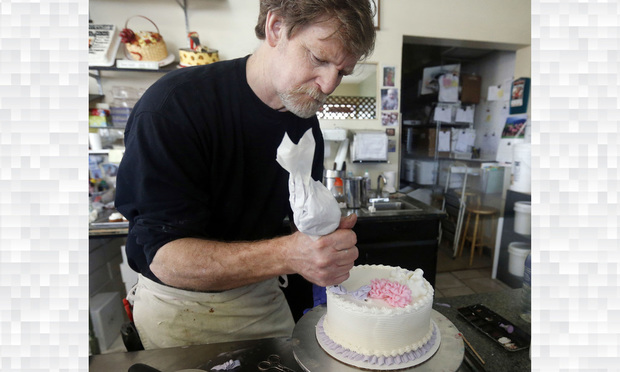What Masterpiece Cakeshop Tells Us About the Travel Ban
The high court has underscored that government officials cannot act on the basis of religious animus. Will the justices hold President Donald Trump to those same principles of religious neutrality?
June 05, 2018 at 12:33 PM
7 minute read
 In this March 10, 2014, file photo, Masterpiece Cakeshop owner Jack Phillips decorates a cake inside his store in Lakewood, Colorado. Photo Credit: Associated Press
In this March 10, 2014, file photo, Masterpiece Cakeshop owner Jack Phillips decorates a cake inside his store in Lakewood, Colorado. Photo Credit: Associated Press
In Masterpiece Cakeshop v. Colorado Civil Rights Commission, the U.S. Supreme Court resolved the claim of a baker who wanted to refuse to sell a cake to a gay couple who sought to celebrate their marriage. But its decision probably says more about the legality of President Donald Trump's entry ban than it does about the ability of merchants to refuse to comply with nondiscrimination statutes.
Masterpiece Cakeshop presented the high court with an opportunity to decide whether merchants have a First Amendment right not to comply with generally applicable nondiscrimination statutes. The baker argued that Colorado's prohibition on sexual-orientation discrimination infringed his right to free speech, because it compelled him to express views with which he didn't agree, and infringed his right to religious liberty, because it compelled him to associate with a relationship to which he harbored religious objections. And he sought an exemption from nondiscrimination provisions for him and others like him.
The Supreme Court didn't give him one.
Instead, it held that the “Colorado Civil Rights Commission,” the adjudicatory body that found the baker not in compliance with Colorado's nondiscrimination statute, had approached the baker's case with “elements of a clear and impermissible hostility toward” the baker's “religious beliefs.” In other words, the commission's handling of this particular case was unconstitutional because the commission had acted on the basis of religious animus. That wouldn't necessarily, or even likely, be true of other cases involving the application of generally applicable nondiscrimination statutes.
The majority in Masterpiece Cakeshop recognized, “it is a general rule that” “religious and philosophical objections,” while protected, “do not allow business owners and other actors in the economy and in society to deny protected persons equal access to goods and services under a neutral and generally applicable public accommodations law.” But, it concluded that the commission's “consideration of this case was inconsistent with the state's obligation of religious neutrality” because “religious hostility on the part of the state” was “a factor” in the state's decision.
How SCOTUS Might Approach the First Amendment Challenge to the Travel Ban
While religious hostility might not be present in many other cases involving the application of nondiscrimination statutes to objecting merchants, it is present in another case the Supreme Court will decide this term—Trump v. Hawaii, the challenge to the president's travel ban. The challenged travel ban suspends entry into the United States by nationals of several Muslim-majority countries, after prior iterations of the ban did so on a temporary basis.
Masterpiece Cakeshop contains several nuggets that speak to how the court might approach the merits of the First Amendment challenge to the travel ban, if it were to reach it. For one thing, Masterpiece Cakeshop disposes of the argument that the travel ban is lawful because it would be lawful but for the fact that the president's decision to sign it may have been influenced by religious hostility and animus. Masterpiece Cakeshop makes clear that doesn't matter—just because the application of nondiscrimination statutes to religious objectors might be valid in some cases, the court says, does not mean they are valid when they are applied to a religious objector on the basis of religious hostility.
Masterpiece Cakeshop also disposes of the argument that other factors might have contributed to the president's travel ban and that it is not sufficiently clear that religious animus infected the ban. In Masterpiece Cakeshop, it was enough that the commission's adjudication had “some elements of” religious hostility. Masterpiece Cakeshop was also the occasion for a majority of the Supreme Court justices to seemingly embrace what had previously been the views of only a plurality of justices in Church of Lukumi Babalu Aye v. Hialeah (1993), that “statements made by lawmakers may properly be taken into account in determining whether a law intentionally discriminates on the basis of religion.”
 U.S. Supreme Court. (Photo: Diego M. Radzinschi/ALM)
U.S. Supreme Court. (Photo: Diego M. Radzinschi/ALM)And the evidence of the commission's religious hostility in Masterpiece Cakeshop was far less compelling than evidence of the president's in the travel ban case. In Masterpiece Cakeshop, the high court pointed to the following statements by commissioners, as well as the fact that the state did not subsequently disavow them: one, that “[I]f a businessman wants to do business in the state and he's got an issue with the—the law's impacting his personal belief system, he needs to look at being able to compromise,” the other that “Freedom of religion and religion has been used to justify all kinds of discrimination throughout history, whether it be slavery, whether it be the Holocaust, whether it be—I mean, we—we can list hundreds of situations where freedom of religion has been used to justify discrimination. And to me it is one of the most despicable pieces of rhetoric that people can use to—to use their religion to hurt others.”
Now line up those statements with what Trump said or formally proposed on immigration in the final months of his 2016 campaign: “Donald J. Trump is calling for a total and complete shutdown of Muslims entering the United States”; “Islam hates us”; and “You're going to have to watch and study the mosques, because a lot of talk is going on at the mosques.” And he kept the proposal for a shutdown of Muslims entering the United States on his website until May 2017.
There are many other similar statements. The point is that it would be hard to say, with a straight face, that the commission's statements in Masterpiece Cakeshop were sufficient evidence of animus, but the president's statements were not.
Differences Without Distinction?
The court is not always consistent in its reasoning. And there are ways one could distinguish the entry ban case from Masterpiece Cakeshop, though none of them are especially persuasive. Yes, the entry ban pertains to immigration, but immigration is not a Constitution-free zone. Likewise, the entry ban challenge involves the president rather than a state official, but the president is bound by the First Amendment to the Constitution just as state officials are. And while some of the president's animus-laden statements happened before the entry ban, he never disavowed them and instead implicitly affirmed them by insisting that the entry ban fulfills promises he had made.
Even if the Supreme Court ultimately embraces one of those distinctions, that wouldn't change the fundamental reality. The high court has underscored that government officials cannot act on the basis of religious animus. In doing so, the court rejected many of the arguments that have been made to ward off the First Amendment challenge to the entry ban. Court observers will look to see whether the justices will be willing to hold Trump to those same principles of religious neutrality.
Leah Litman is an assistant professor of law at the University of California, Irvine School of Law where she teaches and writes on constitutional law and federal courts. You can find her on Twitter @LeahLitman, or regularly on the internet at the blog Take Care. This piece is adapted from a post on that blog.
This content has been archived. It is available through our partners, LexisNexis® and Bloomberg Law.
To view this content, please continue to their sites.
Not a Lexis Subscriber?
Subscribe Now
Not a Bloomberg Law Subscriber?
Subscribe Now
NOT FOR REPRINT
© 2025 ALM Global, LLC, All Rights Reserved. Request academic re-use from www.copyright.com. All other uses, submit a request to [email protected]. For more information visit Asset & Logo Licensing.
You Might Like
View All
4th Circuit Upholds Virginia Law Restricting Online Court Records Access
3 minute read
Trump Seeks Pause of Supreme Court Cases, Disavows DOJ Stance on Voting Rights Act

Supreme Court Takes Up Case Over Approval of Religious Charter School

'Where Were the Lawyers?' Judge Blocks Trump's Birthright Citizenship Order
3 minute readTrending Stories
Who Got The Work
J. Brugh Lower of Gibbons has entered an appearance for industrial equipment supplier Devco Corporation in a pending trademark infringement lawsuit. The suit, accusing the defendant of selling knock-off Graco products, was filed Dec. 18 in New Jersey District Court by Rivkin Radler on behalf of Graco Inc. and Graco Minnesota. The case, assigned to U.S. District Judge Zahid N. Quraishi, is 3:24-cv-11294, Graco Inc. et al v. Devco Corporation.
Who Got The Work
Rebecca Maller-Stein and Kent A. Yalowitz of Arnold & Porter Kaye Scholer have entered their appearances for Hanaco Venture Capital and its executives, Lior Prosor and David Frankel, in a pending securities lawsuit. The action, filed on Dec. 24 in New York Southern District Court by Zell, Aron & Co. on behalf of Goldeneye Advisors, accuses the defendants of negligently and fraudulently managing the plaintiff's $1 million investment. The case, assigned to U.S. District Judge Vernon S. Broderick, is 1:24-cv-09918, Goldeneye Advisors, LLC v. Hanaco Venture Capital, Ltd. et al.
Who Got The Work
Attorneys from A&O Shearman has stepped in as defense counsel for Toronto-Dominion Bank and other defendants in a pending securities class action. The suit, filed Dec. 11 in New York Southern District Court by Bleichmar Fonti & Auld, accuses the defendants of concealing the bank's 'pervasive' deficiencies in regards to its compliance with the Bank Secrecy Act and the quality of its anti-money laundering controls. The case, assigned to U.S. District Judge Arun Subramanian, is 1:24-cv-09445, Gonzalez v. The Toronto-Dominion Bank et al.
Who Got The Work
Crown Castle International, a Pennsylvania company providing shared communications infrastructure, has turned to Luke D. Wolf of Gordon Rees Scully Mansukhani to fend off a pending breach-of-contract lawsuit. The court action, filed Nov. 25 in Michigan Eastern District Court by Hooper Hathaway PC on behalf of The Town Residences LLC, accuses Crown Castle of failing to transfer approximately $30,000 in utility payments from T-Mobile in breach of a roof-top lease and assignment agreement. The case, assigned to U.S. District Judge Susan K. Declercq, is 2:24-cv-13131, The Town Residences LLC v. T-Mobile US, Inc. et al.
Who Got The Work
Wilfred P. Coronato and Daniel M. Schwartz of McCarter & English have stepped in as defense counsel to Electrolux Home Products Inc. in a pending product liability lawsuit. The court action, filed Nov. 26 in New York Eastern District Court by Poulos Lopiccolo PC and Nagel Rice LLP on behalf of David Stern, alleges that the defendant's refrigerators’ drawers and shelving repeatedly break and fall apart within months after purchase. The case, assigned to U.S. District Judge Joan M. Azrack, is 2:24-cv-08204, Stern v. Electrolux Home Products, Inc.
Featured Firms
Law Offices of Gary Martin Hays & Associates, P.C.
(470) 294-1674
Law Offices of Mark E. Salomone
(857) 444-6468
Smith & Hassler
(713) 739-1250








